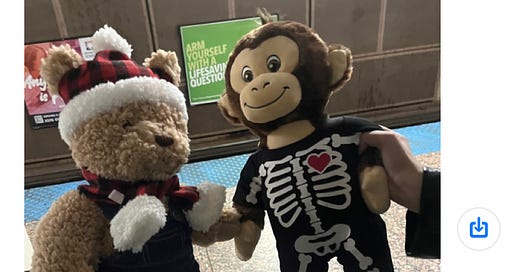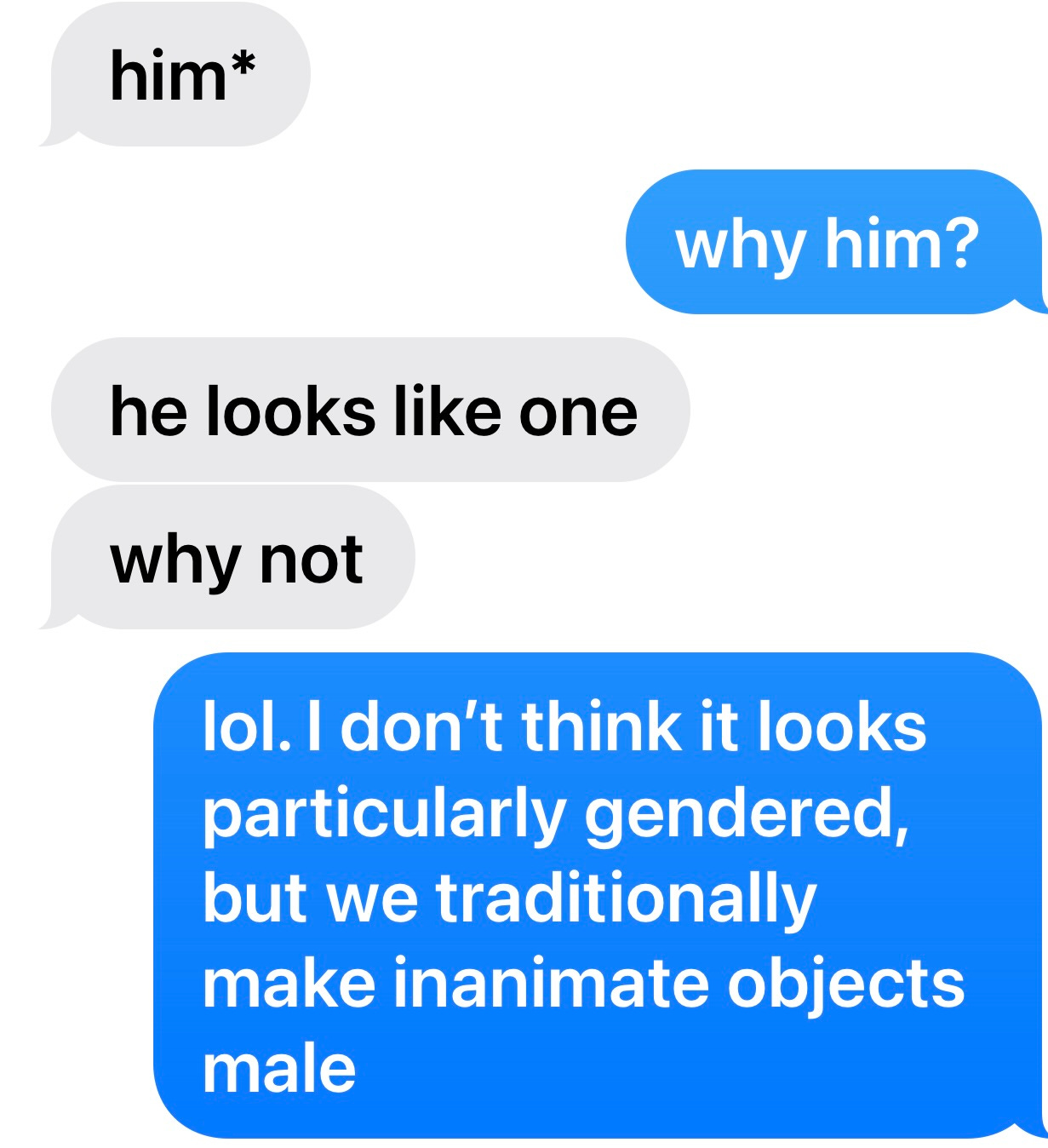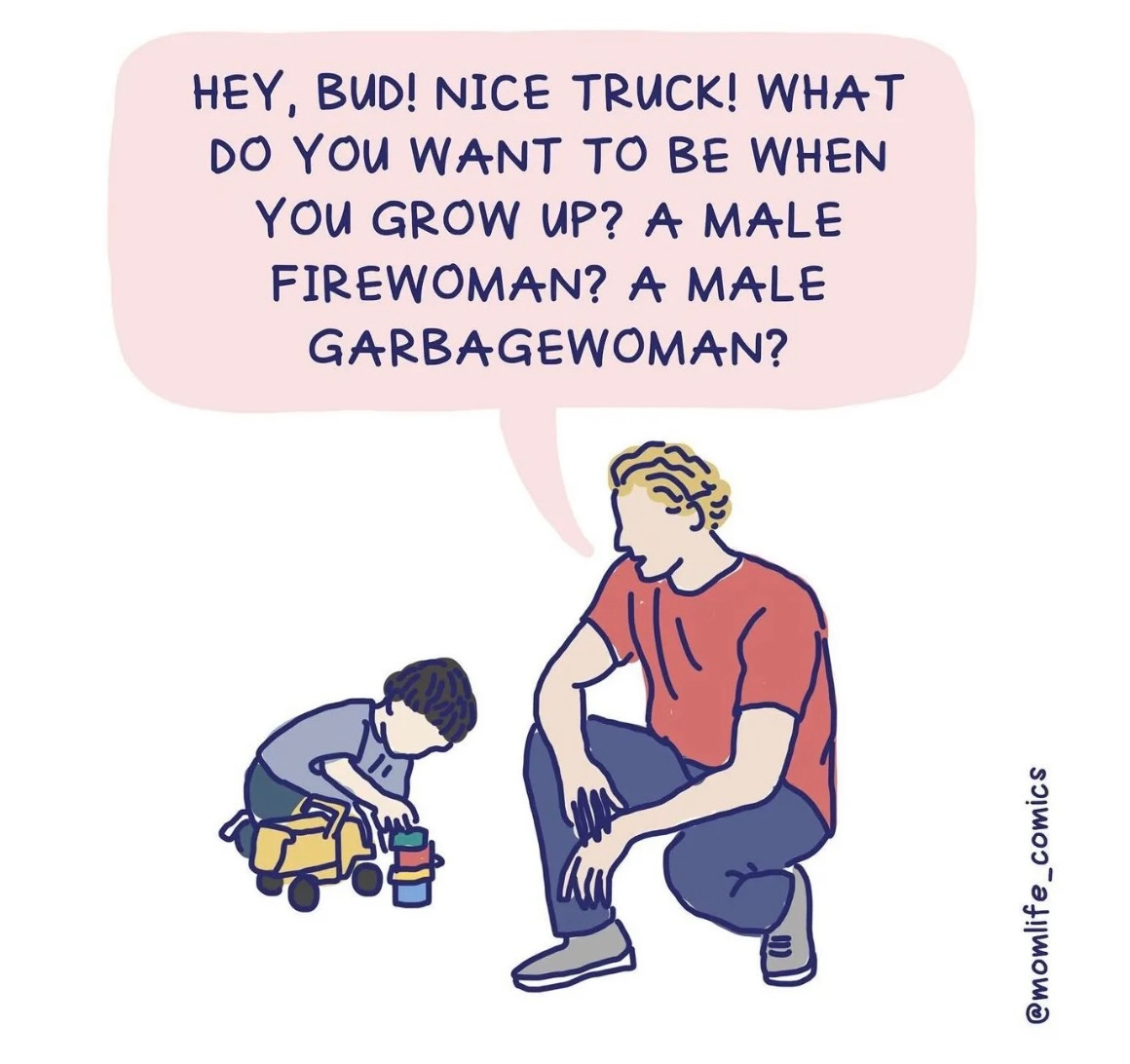Bias in Language has profound effects on young minds
Here's what you can do to change that...and annoy your daughter in the process (sorry not sorry)
A recent text exchange about a photo my daughter sent me wherein I make my her sigh (and she makes me laugh):
When my daughter was little she insisted that every one of her stuffed animals were girls and wouldn’t hesitate to correct anyone who misgendered them. The screenshots above are a text exchange with my now 15-year-old daughter who sent me a picture after a recent, impromptu visit to Build-A-Bear with a friend. It’s probably a sign of maturity that she no longer plays much with stuffies, but can maturity explain why this stuffie—the first new one in years—no longer needs to be gendered female? Or is it a sign that our male-centric culture has taken hold?
I have no idea.
But I do know that both covert and overt sexism are built into the English language. For example, as I annoyingly pointed out to my daughter (who knows me too well at this point), we tend to automatically assign male pronouns to animals and inanimate objects: Your dog’s so cute…what’s his name? Hello, Mr. teddy bear! Language shapes culture and linguistic sexism is just another way we lead girls to believe they aren’t central to the world’s story; that boys are the default.
Thankfully, culture also shapes language and the women’s movement has expanded our lexicon to include female or gender neutral terms, such as policewoman or salesperson. Still though, we’ve got a patriarchal hangover and gendered words are a hard habit to break. Gendered words belittle women's contributions to society and profoundly effecting the minds of small children. To wit, studies show that when people are given words like 'businessman' and 'fireman', the vast majority of them will later visualize, describe, or illustrate men doing these jobs. Years ago, only men were allowed to work in these professions. But using that language today just perpetuates a system that promotes men as the ones who are strong, intelligent and in charge. What then, does that say about women?
The good news is research shows using gender fair language contributes to the reduction of gender stereotyping and discrimination. By proactively choosing more inclusive words and changing sexist language patterns (which I’ll get specific about below) we’re letting our daughters know that they’re entitled to move away from life’s periphery; that they belong. We are also helping to fine-tune their “sexism detectors” so they can identify biased language when they encounter it in other contexts. The comic below is case in point of why simply putting female in front of male-centric words, just doesn’t cut it.
Using gender-fair language
Before my kids could read, I was known to occasionally change the gender of characters in pictures books from ‘he’ to ‘she’, and I suggest you do, too, because yes, even today, main characters in children’s books are still overwhelmingly male. Books are an important cultural mechanism for teaching gender roles to children and, unfortunately, we haven’t come that far since Richard Scarry’s Busy Town where the boy cat and bunny inhabitants were assigned all the city jobs while the girl cats and bunnies stayed home to iron and clean the kitchen.
We need to be careful, however, not to accidentally introduce bias in our attempt to remove it. Susan Gelman, a psychologist who studies language and concept development in young children explains that “even a statement that seems to contradict a stereotype, such as ‘Girls can be firefighters, not just boys,’ reminds the child of the stereotype that girls aren’t firefighters. Children are highly sensitive to the subtle implications in parental talk about boys and girls.” So rather than insisting girls can do anything boys can do, just show girls doing it. This is also an argument for using gender neutral language when gender isn't relevant to a role. For example, it’s possible to say policewoman if the officer is a woman, but the feminized version of a word often develops inferior or negative connotations, so it’s best to use "police officer.” Other examples include: flight attendant, firefighter, chair, and actor.
Gendered jobs may be on the decline but stereotypes are stubbornly persistent—nurse-her, doctor-his, teacher-her, financial analyst-his. Representation really does matter so consider changing up word and pronoun pairings. And when it comes to words that incorporate the word 'man,’ go for gender-neutral alternatives. For man-made, use artificial or synthetic; for mankind, use humankind; for manpower, use workforce. Also, have you ever noticed the tendency for the male version to come first in binomials such as 'men and women', 'brothers and sisters', 'boys and girls', or 'Mr. and Mrs.’? Switch it up! (Better yet, use ‘Ms!’)
Finally, using the passive voice, especially with regard to violence against women, also has sexist implications. Saying “a female student was sexually harassed” instead of “a man sexually harassed a female student” erases the man responsible and makes the woman the subject (rather than the grammatical object), leading us to think of harassment as a “women’s issue.” Even the term 'violence against women' is problematic. It's a passive construction; there's no active agent in the sentence." Let’s call it men’s violence against women.
In the text exchange pictured above, when my daughter said the bear was male and challenged me with “why not?” clearly knowing I had a point to make (which is why I LOLed), I had to decide whether or not to be annoying. I thought about how many opportunities for women and girls have been transformed due a generation of feminists willing to stand up and be “annoying” or “nitpick-y” and decided to channel my deep annoyingness in the service of challenging subtle, everyday sexism. Like most kinds of subtle sexism, linguistic sexism is a boiling frog, and using gender fair language is another way to help our daughters identify precarious waters.










